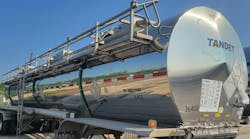WITH domestic crude oil production surging across the United States, petroleum storage and transload terminal operators are scrambling to keep up. New facilities are being built, and existing locations are being expanded.
Storage and transload terminal activity is especially intense in the major oil shale plays and along the US Gulf Coast, with its high concentration of refineries and petro-chemical plants. Here is a short roundup of some of the most recent activity:
Enterprise Products Partners LP recently announced that the initial phase of its Enterprise Crude Houston (ECHO) storage terminal in Harris County, Texas is complete and the facility is now receiving deliveries of crude oil. The first three storage tanks total 750,000 barrels of storage capacity.
The next phase of the ECHO terminal expansion includes the addition of up to 900,000 barrels of storage capacity, which could be in service as early as the first quarter of 2014. Enterprise estimates that the ECHO facility could have up to 6 million barrels of crude oil storage capacity when completed.
“Enterprise's ECHO facility is at the center of a historic and fundamental shift in our nation's crude oil infrastructure by linking growing supplies of North American crude and condensate production with the US Gulf Coast refining complex,” says AJ “Jim” Teague, executive vice-president and chief operating officer of Enterprise's general partner. “We are very pleased to announce the completion of the initial phase of ECHO. Our investments in ECHO, the recently completed Eagle Ford Shale pipeline and the Seaway Crude Oil pipeline will benefit both producers and consumers of crude oil while supporting energy security for our nation. Ultimately, ECHO will provide pipeline and waterborne access to every major Gulf Coast refinery, representing more than 7 million barrels per day of capacity.”
Recognizing the flexibility and market liquidity potential of ECHO and its significance as a delivery hub for growing sources of North American crude oil, ECHO is under consideration by the New York Mercantile Exchange as a regional pricing point for the US Gulf Coast crude market. Through the Seaway crude oil pipeline, ECHO will be connected to the storage hub in Cushing OK, the NYMEX benchmark pricing point for its West Texas Intermediate crude oil contract.
Oiltanking Partners LP announced in September that the board of directors of its general partner approved a $70 million expansion project to construct approximately 3.3 million barrels of new crude oil storage capacity at its Houston, Texas terminaling facility. The project, named Appelt II, will be located adjacent to Appelt I which was announced in April 2012 and is currently under construction.
The partnership anticipates commencing construction by the beginning of the second quarter of 2013 when all relevant permits are in place. The additional storage capacity is expected to be placed into service during the third and fourth quarter of 2014. Once complete, the new storage capacity will bring total active storage capacity at the partnership to over 25 million barrels.
Arc Terminals LP (Arc Terminals) announced in early November that it is working with the CN Railroad to build a rail tank car unloading terminal in Mobile, Alabama, to handle Western Canadian heavy and Bakken light crude oils destined to Gulf Coast refineries. The CN-served facility, which will have a maximum crude-oil handling capacity of 75,000 barrels or up to 120 tank cars per day, is scheduled to start operation by June 2013. Initial volume is expected to be 40 tank cars of crude oil daily, increasing according to demand.
John Blanchard, president of Arc Terminals, says: “The Mobile facility — the first rail tank car crude-oil unloading terminal in Alabama — will provide good access to Gulf Coast refineries and allow quick turnaround of tank cars, increasing product delivery and fleet velocity and reducing costs for car owners. The rail transload terminal will handle heavy crude oil from Western Canada and light crude oil from the Bakken basin via CN, which will provide Canadian producers single-haul service to our Mobile destination. A single-line haul is more efficient and less expensive than those involving two or more rail carriers and multiple terminal switching.”
The Mobile terminal will also load condensate into tank cars for backhaul by CN to Western Canadian oil producers. In addition, it will be able to accommodate both general purpose and insulated and coiled cars, compared with other facilities capable of handling only general purpose tank cars.
The new rail transloading facility will be connected to Arc Terminals' Blakeley tank farm via a new pipeline. Once the product reaches Arc Terminals' facilities, crude oil can be delivered efficiently to customers on the Gulf Coast via pipeline or by vessel as far as Corpus Christi, Texas. The Blakeley terminal has a storage capacity of 700,000 barrels for crude, fuel oil, and asphalt. Terminal capacity could be expanded to more than one million barrels to meet potential future demand.








